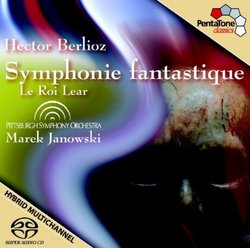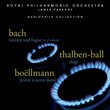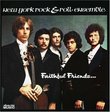| All Artists: Pittsburgh Symphony Orchestra Title: Berlioz: Symphonie fantastique; Le Roi Lear, Op. 4 (King Lear) Members Wishing: 0 Total Copies: 0 Label: Pentatone Original Release Date: 1/1/2010 Re-Release Date: 6/29/2010 Album Type: Hybrid SACD - DSD Genre: Classical Style: Number of Discs: 1 SwapaCD Credits: 1 UPC: 827949033865 |
Search - Pittsburgh Symphony Orchestra :: Berlioz: Symphonie fantastique; Le Roi Lear, Op. 4 (King Lear)
 | Pittsburgh Symphony Orchestra Berlioz: Symphonie fantastique; Le Roi Lear, Op. 4 (King Lear) Genre: Classical
|
Larger Image |
CD DetailsSimilar CDs |
CD ReviewsModest but true Berlioz, very well recorded MartinP | Nijmegen, The Netherlands | 08/07/2010 (4 out of 5 stars) "Pentatone's cover design for this one verges on the criminal, but fortunately that cannot be said of the playing. Janowksi and his Pittsburgh players turn in a very fine performance of the Fantastique that is well worth considering. It is unexaggerated, modest in the positive sense of the word, and it is has some beautifully expressive solo playing in the winds (oboe and bassoon in particular). The first movement is somewhat mellow rather than hysterically dramatic; I did feel Janowski underplays sforzati too often. But it is all very well considered, controlled, with a natural rubato, and the overall result is definitely atmospheric. The same goes for the Ball Scene, thankfully without the cornet part, and, better still, not taken as a concerto for the harps. The wonderfully rich and detailed recording adds delectable little touches, like the often inaudible guirlandes in the first violins at #28. The Scene au Champs is similarly successful, languorous without dragging, and again with some very beautiful solo playing. The thunder at the end is done sensibly rather than spectacularly, quite as the score suggests: it doesn't rip the music in shreds, but is an integral part of it.
If that sounds maybe a tad staid, don't be fooled: the concluding movements lack nothing in Gothic thrills. It is a pity that, uncharacteristically, the drum sextuplets that open the March are very indistinct, but the atmosphere is no less menacing for it. The forte is played legato and not too loud; others may be more sensational, but they in fact deviate from the score. Janowksi keeps something in reserve for the final climax, which is hair raising, with an excellent bass drum. The Witches Sabbath is eerie as it should be, very engaging, with a good sense of mounting excitement and madness. There are wonderfully shameless wind glissandi, and the bells are well chosen. But the glory of both this and the previous movements are the Pittsburgh brass, who offer a rich palette of diverse colors to rival those on Norrington's pioneering historically informed recording with the London Classical Players (still a prime recommendation). The sound (only heard in stereo by this listener) is warm and open, very detailed, with a rich and distinct bass. I do find the dynamic range somewhat constricted, especially towards the pp end of the scale, but can't judge whether this is caused by Janowski or his engineers. The presence of an audience is betrayed by no more than one or two distant coughs. With the far less often recorded King Lear overture as a worthwhile filler, this is a very nice disc indeed." |

 Track Listings (9) - Disc #1
Track Listings (9) - Disc #1

